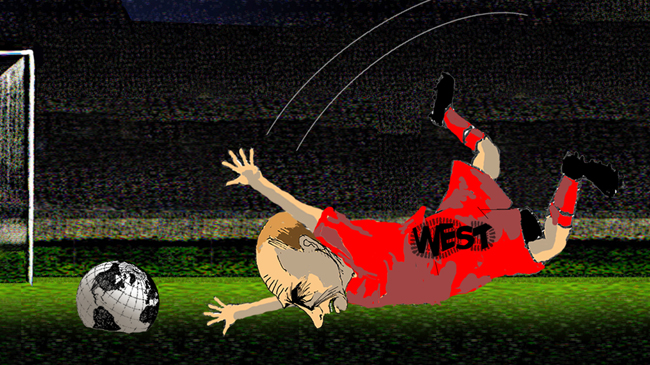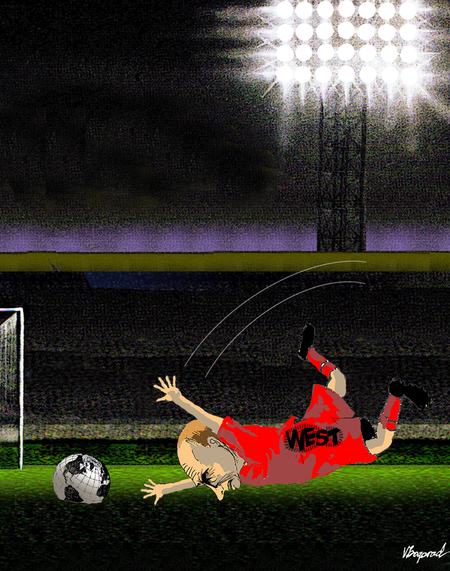Between formality and effectiveness
In what “condition” are Western sanctions against Russia and can they force the Kremlin to end the war?
“The Ukrainian side has put forward a clear proposal: let us examine extending sanctions not for six months but for the entire year 2017. EU member states are now discussing this question,” President Petro Poroshenko said past Sunday in an interview with Ukrainian TV channels, adding that the European Union no longer discusses whether or not to continue sanctions if the Minsk Agreements are not implemented.
Imposing sanctions against Russia is one of the West’s instruments of pressure on the aggressor which is trying, also at the expense of Ukraine, to regain the status of a global player. In response to US and EU sanctions, the Kremlin imposed its own, anti-Western, sanctions, banning the import of a number of European goods. To impress the Russian public, state-run TV channels showed an excavator destroying the imported fruit, cheese, and ham. Don’t worry that the Russian grassroots will be affected – they are used to being poor…, as long as there is a vast territory with all the necessary natural resources.
The appearance of Putin’s aide Surkov, who is on the European sanctions list, at the Berlin negotiations is an indication of the current state of relations between the European Union and Russia. The Germans explain that he participated in the “Normandy format” because the Russian side had sent a request for an exception for him, which was satisfied. But the problem is far deeper. The Europeans are more and more calling for the lifting of sanctions against Russia and saying that Ukraine should meet its commitments under the Minsk Agreements. The message in fact is that, although the Kremlin is dodging its own responsibility under the agreement, not to mention unleashing war and occupying some Ukrainian territories, Ukraine must grant special status to the Russia-seized part of the Donbas without regaining control over its land.
“A friend of mine has called me after coming back from Moscow,” Valentyna Rudenko writes in Facebook. “He had to spend a few days there to see his relatives. He says that a year ago this time Moscow’s ABC of Taste food stores, for example, offered no other than Belarusian cheeses. But now the same stores present a full range of EU delicacies – jamon, prosciutto, Belgian pate, French wines, and an extremely wide choice of French, German, Swiss, and even British cheeses, – as they did two years ago before sanctions were imposed. ‘Fromage, Sir,’ so to speak. My friend asks: ‘Do you think they have lifted sanctions?’”
They haven’t lifted sanctions. But the latest events show a noticeable thaw in the European-Russian relations. Even such a barbarian action of Russia as bombardment of civilian facilities in the besieged Syrian city of Aleppo is not taken into account. EU member states resolved at their last summit to increase pressure on Moscow and the Syrian government, but they failed to unanimously agree on sanctions. They only warned vaguely that “the EU will examine all the available options if the current violence continues.” Only Italy, which maintains close trade relations with Russia, opposed this, at least openly. Prime Minister Matteo Renzi said that economic sanctions must not be part of this strategy because they will not force Moscow to negotiate a peaceful settlement.
Have any negotiations with the Russians on the Ukrainian or Syrian problem produced a serious result in the last while? Even though some agreements, such as those of Minsk, were signed, the Kremlin does not carry them out. Moreover, the Russian government has been long and consistently “working” with Western countries, with due account of their diversity and weak points. The goal is to water down the West’s position and sow discord in its ranks. As a matter of fact, the Italian premier’s position confirms this, as do the trips of some politicians and culture figures to Russia, moreover to the occupied Crimea, where they speak about the necessity to cement friendly relations.
Polish film director Krzysztof Zanussi is among Russia’s friends. Rossiyskaya Gazeta published a big interview with him, titled “Nobody Should Be Taught to Live Right.” Reflecting on this in his blog “The Curse of Western Intellectuals” (yakovenkoigor.blogspot.ru/ 2016/10/blogpost_23.html), Russian journalist Igor Yakovenko writes: “Meanness remains meanness even if you justify a dictatorial regime in the soft form of defending ‘diversity of the world.’”
Yakovenko continues: “However, Western thinkers, who consider Putin’s regime a dictatorship and give advice about dismantling it, most often know about what is going on in Russia no more than Putin’s Western aficionados. The Financial Times has advised Russian oligarchs to take the country’s destiny into their hands, as they did in 1996. ‘Twenty years ago, a small group of Russian businesspeople saved the country… and now oligarchs must intervene again,’ British analysts think. In their opinion, ‘oligarchs should take a risk and organize a change of power in the Kremlin’ (quoted from Inosmi.ru).
“It’s not even necessary to take into account the assessment of what occurred in 1996. I am convinced it was the final burial of democracy, and someone else considers it as its salvation. Let’s consider this matter disputable, though it is obvious to me. But as for those whom British analysts advise to overthrow Putin, I hope there are no differing opinions. Do any of the Russians, who know who Abramovich and Kovalchuk, Rotenberg and Usmanov, Fridman and Prokhorov, Deripaska and Yakunin, Sechin and Miller are, consider them capable of plotting against Putin?

Sketch by Viktor BOGORAD
“The abovementioned Putin’s oligarchs have either become as such thanks to being close to Putin or preserved their status thanks to loyalty to him. He is their ‘cover,’ and if they lose it, they will end up in a space of uncertain prospects – from being stripped of a large part of the fortune made by backbreaking toil to languishing in prison. Another circumstance that makes the advice of British ‘experts’ to Russian oligarchs absurd is fear. All Putin needs to do is stare at any of the abovementioned ‘comrades,’ and they will wet their pants.”
So to what extent is the instrument of sanctions against Russia real and viable?
“EUROPE HAS RUN INTO A NUMBER OF PROBLEMS IT HAS NEVER KNOWN BEFORE, WHICH DIVERTS ITS ATTENTION FROM THE WAR IN UKRAINE”
Andrzej SZEPTYCKI, analyst, Institute of International Relations, Warsaw University:
“The question of sanctions should be examined in two dimensions – economic and political. The economic dimension is limited and, hence, not a 100-percent effective. Naturally, this results in some trade between Russia, the EU, and Ukraine. And it is not only about foodstuffs. It is about even some military materiel. For example, Ukraine’s company Motor Sich supplied engines for Russian helicopters. As for the current situation, the same happens with every law which some obey and others break. At the same time, we can see certain results of the sanctions, so it would be wrong to say that they do not work.
“As for the political dimension of the consequences of sanctions, they, first of all, show the West’s negative attitude to the Russian aggression against Ukraine. It is also a political attitude. Therefore, sanctions are an element of solidarity between EU members and Ukraine about Russia’s behavior. Undoubtedly, there are also some forces in Europe that can be called pro-Russian. They are trying to do their best to lift or at least to alleviate the sanctions. What does it mean? It means that these measures have hit Russia and the latter is trying hard to ward off sanctions. If they had no effect, there would be no reason why the Kremlin should struggle against them. Besides, Europe has run lately into a number of problems it has never known before. This diverts its attention from the war in Ukraine, which has a negative effect on the viability of the abovementioned measures.
“Yet the EU has understood in the past two years what is going on in your country, and even some countries, such as France, which were at first taking a positive attitude to Russia, consider it an aggressor now.”
“CARRYING ON TRADE WITH CRIMEA AND OTHER OCCUPIED TERRITORIES, WE OURSELVES UNDERMINE THE REGIME OF SANCTIONS”
Hryhorii PEREPELYTSIA, Doctor of Political Sciences, conflictologist, professor at Taras Shevchenko National University of Kyiv:
“Undoubtedly, sanctions will be less and less effective in the course of time, for there is such thing as ability to adapt to obstacles. But the main cause of this is that Ukraine itself began to use ambiguous wording, for example, to call a war an anti-terrorist operation. We haven’t done so in either juridical or political terms. The word ‘war’ only sounds in the statements of a few politicians, which in fact has no impact on the real state of affairs. Thus, since February 20, 2014, we have only been accumulating problems with definition, when, on the one hand, we call some things contraband and, on the other, we say that buying coal from the occupied territories is just trade. It only turns out that Russia is not, in legal terms, a warring party. Hence, there can be no complaints against those who trade with her officially. This is a problem because the West has no juridical grounds to punish the aggressor.
“Sanctions are rather a soft measure compared to international blockade. And it is blockade that must be applied to the aggressor and occupier. The West, to which the war against Ukraine is presented as an internal conflict, begins to choose its own rhetoric – why should we lose dividends from sanctions against Russia? There are more and more opinions like this, especially when Europe can see that Ukraine itself continues to trade with the aggressor. As the term of the president’s decree on anti-Russian sanctions expired recently, there was a certain period of time when sanctions were invalid until Poroshenko extended the validity of these injunctions. Those who trade with Russia took advantage of this gap.
“It is also true that Russia herself provoked new sanctions as a result of her actions in Syria, such as bombardment of residential neighborhoods and humanitarian convoys. The West just could not help but react to these obvious crimes. But it does not mean that this is linked with the war in Ukraine. Yet the factor of the upcoming elections in France and Germany will only be easing these sanctions. The governments of these countries will be seeking ways not to irritate business and not to hinder their own economy. Accordingly, less attention will be paid to the circulation of goods. Moreover, there will be further search for other channels of resuming trade with Russia, for it is quite a big market.
“Ukrainian goods are now being carried to Belarus, only to be customs-cleared and forwarded to Russia as Belarusian items. It is in this way that our goods enter Russia across the occupied territories. Undoubtedly, if the front line remains fixed for a long time, this triggers some kind of collaboration. Carrying on trade with Crimea and other occupied territories, we ourselves undermine the regime of sanctions.”
Newspaper output №:
№63, (2016)Section
Topic of the Day





